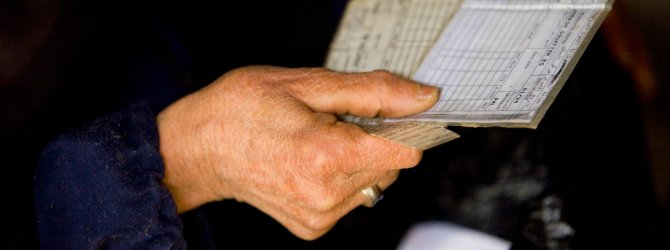-
Beyond the Horizon: A Long-term Development Agenda for ...
Beyond the Horizon: A Long-term Development Agenda for the WANA Region Part Two: Strategic Steps to Advance Reform

Even as winds of war, instability, and stagnation buffet much of West Asia and North Africa (WANA), fresh ideas springing up within the region or adapted from abroad can point the way to positive change. Some such ideas are emerging from the WANA Institute’s recent opinion pieces, starting with HRH Prince El Hassan bin Talal’s overarching call for “a new and inter-disciplinary approach to development”. Pieces penned by such other contributors as Dr. Erica Harper, Julia O’Brien, and Kim Wilkinson complement HRH’s theme. They highlight the roles of women, justice, civil society, refugee relief, and post-conflict recovery in doing what we can today while planning for tomorrow.
My own contribution partly takes account of these authors’ insights, my work in the region and beyond, and other resources such as the Arab Human Development Reports. Building on these factors, I draw on international experience to suggest parts of a potential development agenda for WANA.
This is the second of two separate papers comprising a proposed long-term development agenda for WANA. The first paper, subtitled “Three Key Initiatives on Reform, Law, and Women” proposes a Commission on Long-term Recovery and Reform; a Legal Empowerment Initiative that highlights the use of law and rights specifically to benefit the poor, the disadvantaged, and other populations; and a Women’s Empowerment Initiative to benefit women in particular and (through them) the region more generally.
This second paper proposes a series of approaches and activities that complement the three initiatives:
Civil Society in Stable Development Contexts. The Commission, the two Initiatives, donor funding, and other activities should focus on reformist civil society support wherever possible in relatively stable countries. For legal empowerment, socioeconomic development, and many other fields, NGOs are often incubators of change that introduce and implement new ideas. Even more broadly, as in Bangladesh and some other societies, they often provide more effective health, welfare, justice, and other services than government bureaucracies do.
Obviously, some WANA governments may greatly fear and constrain independent civil society activity. But perhaps in certain countries a focus on a given field – the environment, health, women’s welfare, or accountability in local government service delivery, for instance – might be permitted if it can be shown to advance well-being and stability in unthreatening ways. And in contexts where certain regressive civil society groups might actually serve violent, subversive ends, the answer is not to crush or deny funding to all NGOs and movements but to instead proceed carefully. This includes working through reliable intermediaries such as established international NGOs, which is really simply a matter of sound development practice.
Civil Society in Transitional Contexts. In post-conflict and other transitional situations, where international aid and advice often flow freely, politically and financially supporting civil society’s roles can help countries move along a more prosperous and democratic path. One advantage in some such contexts is that, with so much in flux, there are opportunities to constitutionally, legally, and politically lock in place long-term arrangements that allow civil society to contribute to socioeconomic, legal, and political development. In those countries where domestic civil society is initially too unsophisticated to mount major programs on its own, international NGOs can partner with them and help them mature. This has been the case with legal empowerment initiatives in post-war Sierra Leone, Liberia, Cambodia, and elsewhere.
Legal Implementation. Legal implementation involves efforts to ensure that good laws that exist on the books are enforced on the ground. While law-oriented development aid largely focuses on reforming laws and state legal institutions, it tends to overlook the challenge of getting laws implemented. International experience, including an array of legal empowerment research, illuminates the many effective roles that civil society and other nongovernmental actors (such as academia and media) can play in bolstering enforcement. A WANA Long-term Development Agenda should accordingly emphasize legal implementation.
Paralegals. Paralegals are non-lawyers – sometimes NGO employees and sometimes unpaid volunteers (trained by NGOs) from the very communities they serve – who help people with dispute resolution, land tenure, workplace matters, gender issues, police issues, and other problems. As demonstrated by a forthcoming World Bank study and other research, across the globe, they are an increasingly popular and cost-effective way of delivering justice for the poor and advancing legal implementation. While they can be government employees or in some instances receive government funding, experience from Pakistan, India, Indonesia, Malawi, Ecuador, and a host of other countries indicates that they tend to operate best when working with the independence and flexibility associated with civil society groups.
Traditional Justice Systems. For many people in many communities around the world, particularly in rural areas, the dominant justice systems do not comprise state institutions. Instead, they are traditional community forums that mediate or arbitrate local disputes. People often prefer them to courts for such very justified reasons as convenience, cost, and comprehensibility. Yet traditional forums also can feature extreme gender bias, other undue influences, and even corruption (not that state court systems are always free of such factors). In Bangladesh, Indonesia, and elsewhere, NGOs have employed various strategies to retain the best features of traditional justice systems while gradually ameliorating their harsher elements. The Legal and Women’s Empowerment Initiatives should explore that experience.
A New Generation. The best ideas, energy, and dedication from within any society often flow from young adults seeking new solutions to old problems. The proposed Agenda should accordingly focus on ways to expand youths’ and young adults’ horizons and opportunities. This can involve programs, exchanges, and conferences (both domestic and international) that afford a new generation’s students, young professionals, and promising representatives of disadvantaged communities the chance to develop and learn about new ideas and to serve their societies.
Overcoming Conventional Agendas. Part of the conventional wisdom that has dominated development discourse dictates that the international community should invest in reforming and fortifying government institutions such as judiciaries, parliaments, and police forces. With a few exceptions, the programs stemming from this supposed wisdom have largely failed. As indicated, for example, by an official U.K. commission’s recent report, the government-centered security and justice efforts of the Department for International Development have performed poorly. (The notable, positive exceptions to DFID’s poor performance were civil society efforts that focused on community justice, women, and girls.) As indicated by the above Agenda items, it is accordingly necessary to depart from the conventional wisdom that narrowly and counterproductively places a premium on mechanical, technical, unproductive approaches.
My message here is not that support for state institutions never makes sense. Instead, it must be much more selective going forward, and matched with civil society support wherever possible. A skeletal government superstructure would thus be complemented by sinews of accountability and service delivery constituting a civil society infrastructure. Even more to the point, the region will benefit more over the long haul to the extent that aid focuses less on state institutions and more on civil society, women, legal empowerment, other ideas suggested here, and many more proposals that will spring from the two Initiatives and the Commission. Which brings me to my final point…
Realism and the Long Run. For countries beset by instability, repression or stagnation, does the Agenda proposed here stand a chance of succeeding? This question triggers another one: compared to what? Given the state of much of the region, decades of international support for conventional aid programs in WANA have undoubtedly proven disappointing. Perhaps some aspects have even been counterproductive, by downplaying legal and women’s empowerment and long-term reformist efforts that could gradually improve people’s well-being and state accountability.
But the more fundamental answer to my question lies here: whether gradual or sudden, whether economic or social or political, positive changes that seemed impossible decades ago have benefited billions of people in China, India, Indonesia, South Africa, Central Europe, Latin America and elsewhere. Development is, after all, about the long run. Doing what we can, where we can, with the long run in mind – by nurturing ideas from within WANA and drawing on international experience – cannot transform the region overnight. But it can help nurture some progress today while paving the way for tomorrow.

